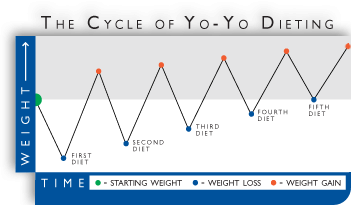Nutrition
Why Diets Don’t Work and How To Really Lose Weight Long Term
Have you ever gone on a diet, lost a few pounds, and then regained it all back in a few months? You’re not alone. Millions of people go on various diets each year, lose some weight, and regain everything back shortly thereafter. It’s absolutely frustrating, isn’t it? If you want to know why diets don’t work and how you can really keep the excess weight off for the long term, then please read on.
What dieting does to your body
There’s no shortage of fad diets that promise very rapid weight loss. From the 3-day diet to the 7-day diet, to cabbage soup diet and juice cleanse diet, even protein shakes and all-liquid diets, and basically any diet that strictly limits or avoids certain food groups for a short period of time – these are all fad diets.
These diets may work in the short-term. You can lose a few pounds quickly in just a matter of days, or several pounds in a couple of weeks. If your goal is to fit into a tight-fitting dress for a high school reunion or a friend’s wedding, then these fad diets can help.
However, if you think you can keep the weight off AFTER you’ve stopped dieting, then you have another think coming. Even in cases where people manage to achieve a satisfying result, after some months of going off the diet, most of them are likely to regain all that weight back!
So, what’s the definition of successful weight loss?
According to a study published in 2019, the definition of a person who has successfully lost weight is someone who has decreased at least 10% of their initial body weight and kept the lost weight for more than a year (1). This means that even if you lose 20% of your body weight but you gain it all back in a year or so, then you didn’t succeed at all in your goal to lose weight.
Here’s what researchers found…
In many cases, the weight regained by those going on diets is more than the weight they initially lost. They end up heavier and with even worse associated health problems, such as diabetes, high cholesterol or triglyceride levels, metabolic syndrome, and hormonal abnormalities.
Every such cycle of weight loss followed by weight regain is linked to a net increase in weight gain and body fat. This because when you lose weight, you lose both fat and some muscle. But when you regain the weight, you regain only the fat (2).

What are the reasons why diets don’t work and many people regain the ‘lost’ weight?
In many cases, the causal reason for obesity is psychological. Thus, even when you manage to have some weight loss through diet, if you didn’t fix the psychological issues, it is possible that this will lead soon to weight regain.
Another group of people manages to lose weight only if they have someone checking and controlling their diets. When there is no doctor or dietitian supervising them, they lose control and go off the wagon. In short, they go back to their unhealthy eating habits.
On the other hand, there are people who don’t try enough to learn how to eat healthily. Instead, they search for a magic pill or magic diet that will help them lose weight quickly with little to no effort. When these methods fail, they get disappointed and stop any further attempt to improve their weight.
On top of these, the lack of physical activity, the lack of time to prepare healthy meals, and impatience to get quick results lead to a failure in achieving or maintaining a successful weight loss. So, it’s really not surprising at all why diets don’t work for most people.
The cycle of yoyo dieting
Studies show that 80% of people who lose more than 10% of their body weight on a diet will have put that weight back on within a year. One third to one half will have put more back on than they originally lost (3).

What is more shocking is that each subsequent time a person goes through the cycle of weight loss then regain (often called ‘yoyo dieting’), the amount of weight regain grows. And the associated health problems such as high blood pressure, high cholesterol, and high blood sugar also get more serious (4, 5).
Managing to limit and avoid weight cycling in the first year after weight loss is crucial for sustainable long-term weight maintenance. The literature shows that there is a 50% decrease in the risk for weight regain in individuals who managed to maintain their successful weight loss for 2 years. The pillar of the strategies to achieve the above-mentioned result is nutritional intervention. This usually includes calorie and/or fat restriction, ketogenic diets, intermittent fasting or combinations of the above (1).
The secret to maintaining a healthy weight for the long term
Here’s how you can keep the excess weight off for the long-term:
Eat a healthy, balanced diet
At the moment, there is no magic pill or magic diet that will result in weight loss with zero effort. The only reliable way to lose weight long term – and keep it off – is to eat healthily without starving yourself.
Of course, some kind of diets like the ketogenic diet could be followed initially to help you make a good start. But if you want long term success, you should later adopt a more realistic and balanced diet such as a low carb diet (read our article here on low carb vs keto diet).
That means eating a variety of foods, cutting out processed foods, refined carbohydrates and sugar. Adding quality foods like salads, fruits and nuts in your meals will help you get the necessary fibers. You’ll also feel the sense of satiety which is necessary to avoid starving. You don’t have to drastically reduce your calories because you do need energy for your daily activities. You also need to get the necessary micro and macro nutrients.
When starting a new diet, allow yourself a few days to adapt to the new status. You’ll initially find yourself craving for sweet and junk foods, but these pass with time and they are much more bearable when calories are not extremely restricted. The longer you go without processed food, the more your hormones are balanced and the fewer cravings you get.

Be more physically active
One of the reasons why diets don’t work is the lack of physical activity. Make sure that you have frequent sessions of physical activity during the week. Choose the ones that you enjoy and will keep doing long-term. If you don’t enjoy it, it’s almost sure that you will soon give it up which will not help you to achieve your goal.
Physical activity is important. Do a combination of aerobic exercise and weight training activities to increase your muscle mass and your metabolism. If your time is limited, you can try spending about 20 minutes doing a high-intensity interval training and take advantage of this duration for the maximum possible results.

Add probiotics to your diet
In addition, you need to feed the bacteria in your gut. That means adding fermented foods and drinks to your diet. Choose ones you like such as sauerkraut, kefir or kombucha (kombucha is my personal favorite), as well as adding a good probiotic supplement daily. Also, ensure you get plenty of fiber (known as prebiotics) in your diet as it acts as food for your gut bacteria.
Be patient
A successful weight loss program takes time. Patience is key to achieving not only your desired weight, but also maintaining it. It is easier to lose weight than maintaining, so you shouldn’t stop exerting effort as soon as you achieve your target weight. To stop worries about why diet’s don’t work, adopt a healthy lifestyle that combines healthy eating and exercise. Get enough sleeping time to balance your hormones. Take up pleasant hobbies that will offer you the necessary mental stability and relaxation (6).
Final words on why diets don’t work
Now that you know why diets don’t work, are you ready to say goodbye to fad diets and start embracing a healthy lifestyle? Think of it as embarking on an exciting journey where your ultimate goal is maintaining a healthy weight! Do share your weight loss journey with us in the comment section below!
References
(1) Contreras, R., Schriever, S. and Pfluger, P., 2019. Physiological and Epigenetic Features of Yoyo Dieting and Weight Control. Frontiers in Genetics, 10.
(2) Di Germanio, C., Di Francesco, A., Bernier, M. and de Cabo, R., 2018. Yo‐Yo Dieting is Better than None. Obesity, 26(11), pp.1673-1673.
(3) Dulloo, A. and Montani, J., 2015. Pathways from dieting to weight regain, to obesity and to the metabolic syndrome: an overview. Obesity Reviews, 16, pp.1-6.
(4) Pietiläinen, K., Saarni, S., Kaprio, J. and Rissanen, A., 2011. Does dieting make you fat? A twin study. International Journal of Obesity, 36(3), pp.456-464.
(5) Montani, J., Schutz, Y. and Dulloo, A., 2015. Dieting and weight cycling as risk factors for cardiometabolic diseases: who is really at risk?. Obesity Reviews, 16, pp.7-18.
(6) Hall, K. and Kahan, S., 2018. Maintenance of Lost Weight and Long-Term Management of Obesity. Medical Clinics of North America, 102(1), pp.183-197.





